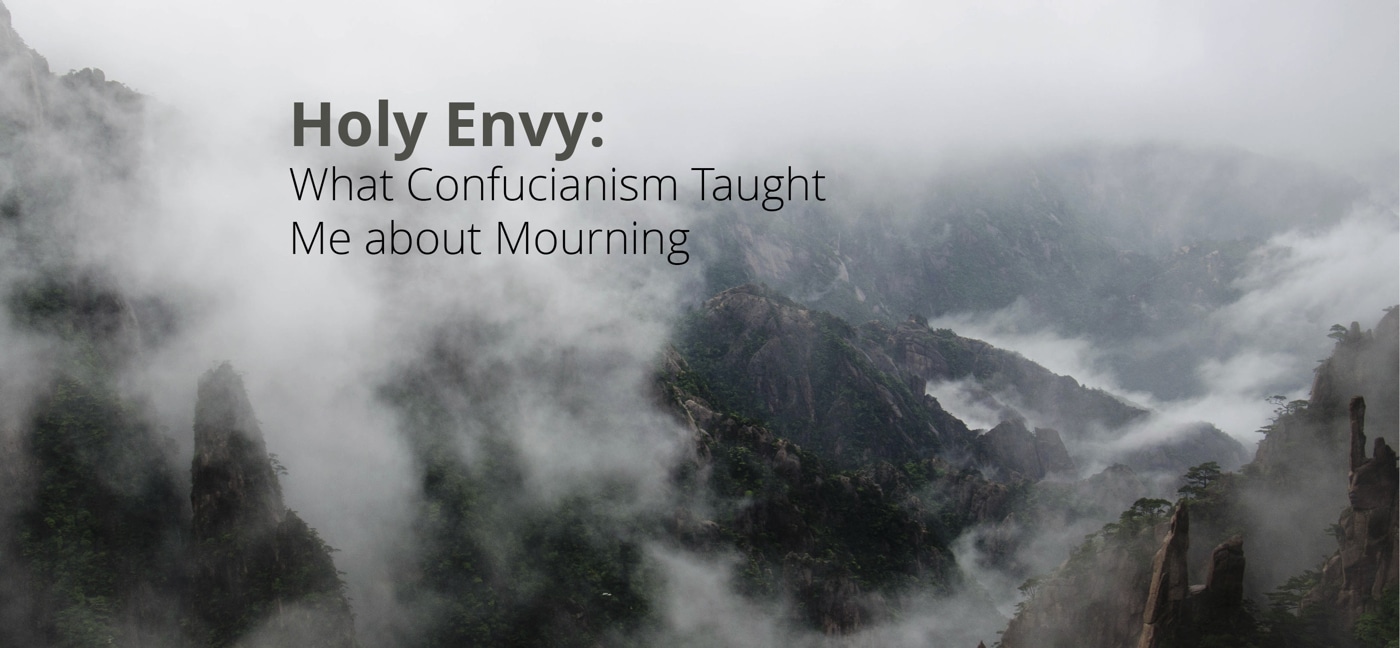Holy Envy: What Confucianism Taught Me about Mourning

I have studied Confucianism for nearly 20 years. More specifically, I research Confucian ritual and ethics dating approximately 2000 years ago. Many of these rituals deal with death and how Confucians mourned for those who passed away. During my studies, I have been struck at how texts written long ago in a foreign place and in a foreign language could speak about grief and loss so poignantly.
One of the texts I work on discusses burial customs. It explains that the dead should be entombed with the things he or she enjoyed while alive. So if our loved ones enjoyed playing musical instruments like a flute or zither, they should be buried with such. However, the instrument they are buried with is significantly different from the instrument they played while alive. The buried instruments, the text explains, should not work. The holes of the flute are not to be carved, and the strings of the zither are not to be tuned. This is because, according to the text, our loved ones are in fact dead and will not actually play them, so there is no use in making them work. However, we should still put them in the tomb, because our loved ones are not entirely gone from us.
This is a remarkable attempt to make sense of the world after the loss of a loved one. To continue living as if nothing has changed is to deny the reality of the loss. To view the loss as something completely severed from our lives is to deny the reality of the relationship we had with the deceased. “Death,” writes one scholar, “marks both an end and a terrible new beginning.”[1]
My grandmother died several years ago, quite unexpectedly. Despite living far away (in Atlanta), she was an important part of my childhood. I grew up spending several weeks with her each summer. She taught me how to swim, fish, and play video games. Her death, in many ways, marked the complete end of my childhood and the beginning of my life as an adult in a world without Grandma.
Confucians practiced elaborate forms of mourning; and mourning is differentiated from grief. The latter is a feeling that comes upon us when confronted with loss. We are “stricken” with grief, often unexpectedly. Mourning, on the other hand, is what we do to cope with grief. In my faith tradition — Mormonism — we often suppress our grief and give it the shortest life possible. We comfort ourselves with reminders of the rewards in the life to come, consoling each other that families are forever, and hope this will remedy our grief. But I believe we could benefit from more constructive ways of mourning.
I am not discounting the consolation that an eternal family brings. At the same time we must not forget, as grand as these promises are, they do not always meet the immediate needs of the mourner. They may not, for instance, help the widow whose three children have come down with the flu and who now must navigate between work and sick kids at home with no one else to watch them. They may not hearten the widower who had been with his wife for 60 years and is now lying in bed at night unable to sleep. Nor will they soothe the friend who now has no one to talk with in her time of need.
It is the mundane parts of life that suddenly become significant when we lose someone. Yet all too often we pretend that the grand parts of the gospel make up for these ordinary moments.
I have learned from my studies that we can change the way we handle grief. Rather than seeing it as a problem in need of a remedy, we can view it as a constitutive part of a meaningful life. This may not lessen the amount of grief we feel, but it will open the door for more fruitful ways of processing it.
Early Confucian tradition had a custom similar to what we call a funeral procession. One text explains:
In following [the funeral procession to the grave], mourners were expectant and anxious as if they were following after [someone alive] but could never quite catch up to him. When returning, they… were hesitant and uneasy as if they sought after [their loved one], but did not find him. As such, when mourners follow [the funeral procession] it is as if they long to see [the deceased still alive]; and when they return it is as if they are bewildered [in not being able to find him].
Regardless of where they sought him, he could not be found. They entered the door to his home, but did not find him there. They ascended up into the main hall, but did not find him there. They entered his personal quarters, but did not find him there. Alas, he was gone; only to be mourned, and never to be seen again!
This is why mourners wail, shed tears, beat their chests, and falter. They stop doing these things only after they fully exhaust their sorrow.[2]
Much of this is foreign to us (and I am not necessarily advocating it) but is also profound. What I get out of this is a stark recognition that as hard as we try to live life as it was lived before the loss of a loved one, it cannot be done. Life before grief is never the same as life after grief. We need more ways to cope with our grief as we learn to live with loss. Death will never stop hurting, but as Confucian ritual teaches us, that hurt can bring new meaning to a new life.
Michael Ing is Associate Professor of Religious Studies at Indiana University. He focuses on ritual, ethics, and issues of vulnerability as they relate to the human condition.
Editor’s note: This essay is part of an ongoing series on Holy Envy. People of various religions explain what they admire in other faiths. The purpose is to increase understanding and solidarity between believers.
[1] Amy Olberding, “Slowing Death Down: Mourning in the Analects,” in Confucius Now: Contemporary Encounters with the Analects, edited by David Jones (Chicago: Open Court, 2008), 143. Olberding’s work on Confucian attitudes toward death informs my description in this article.
[2] Liji, “Wensang,” 36.1.
![]()



